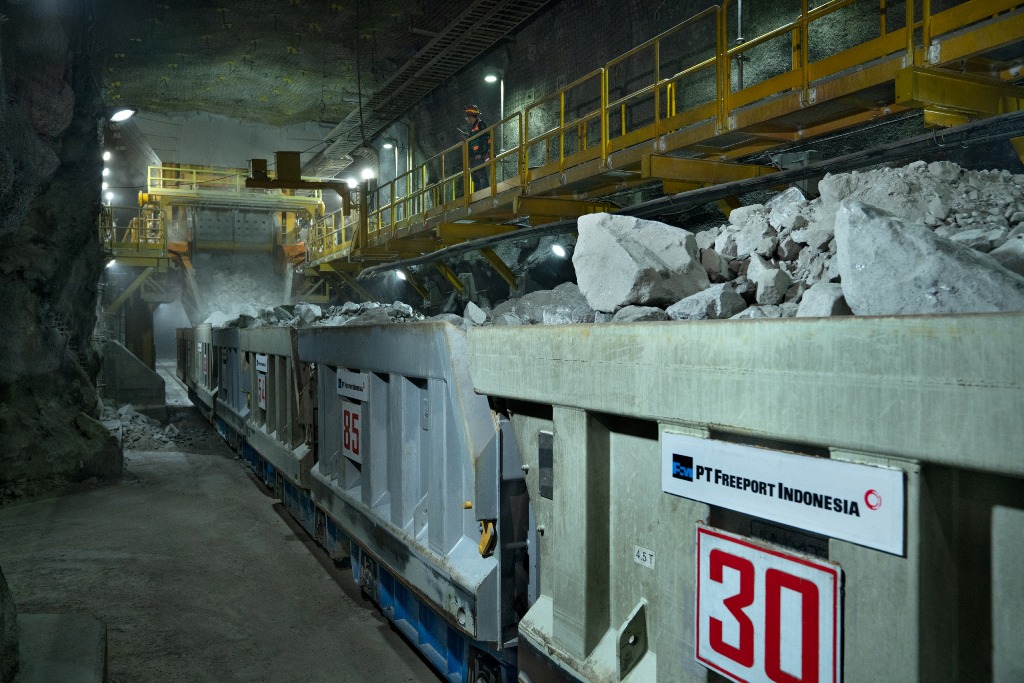News
PTFI distributed Rp7.73t of DBH for Indonesian, Papuan regional governments
WINDONESIA April 25, 2025 PTFI's underground mining site at the Grasberg Block Cave area. (PTFI)
PTFI's underground mining site at the Grasberg Block Cave area. (PTFI)
PT Freeport Indonesia (PTFI) reported that it has deposited Rp7.73 trillion for the central government and several regional governments from the company's net profit throughout 2024. The regions which receive a share include, among others, the Central Papua Provincial Government, Mimika Regency as the producing region, and other regencies in the province.
"The company is always transparent and accountable in carrying out its obligations. Payment of the regional portion of net profit is evidence of the company's commitment to contributing to regional economic development," said PTFI President Director Tony Wenas in a written statement on Apr. 21, 2025.
Of that figure, Rp3.1 trillion went to the Indonesian government while the regional governments receive Rp4.63 trillion. Tony detailed that the Central Papua Provincial Government received around Rp1.16 trillion, the Mimika Regency Government got Rp1.92 trillion, while the other regencies, namely Nabire, Paniai, Puncak, Puncak Jaya, Dogiyai, Deiyai, and Intan Jaya, each received Rp221.2 billion, or Rp1.55 trillion combined.
Tony added that PTFI also continues to be committed towards providing benefits to the community around the company's operating area through various social investment programs. In 2024, PTFI's social investment value surpassed Rp2 trillion and is expected to continue rising by around US$100 million US dollars (about Rp1.5 trillion per year) until 2041.
"Success for PTFI as a company is when the community around the [company's] operating area have their standard of living and welfare improved. We believe that no company can be successful in a failed community. [Hence,] we will continue to grow and develop together with the community until the mining operation is completed," Tony noted.
Meanwhile, Papuan leaders and intellectual figures encouraged the central government and PTFI to sit together with governors throughout Papua to review the distribution of the Revenue Sharing Fund (DBH) related to PTFI's income. For example, Highland Papua Governor Jhon Tabo reminded that PTFI's profits should also be shared with Highland Papua.
Similarly, Highland Papua intellectuals Yohanes P. Lani and Paskalis Kossay requested the central government to evaluate PTFI's DBH scheme so that the people of Papua, particularly indigenous Papuans, could benefit from the company's presence in the island.
"From a cultural perspective, Lapago and Mepago are one inseparable entity. It's fine if they are separated from a government administration perspective. However, from a natural resource management perspective, and as conveyed by Highland Papua Governor John Tabo, please share a certain percentage [of DBH from PTFI] with us in the Highland Papua (or Lapago) region," said Yohanes.
Yohanes asked PTFI and the central government to be responsive and pay attention to their aspirations, considering that mining operations extracting the wealth of Papua in the form of gold, copper, and other mining products carried out by PTFI have been going on for decades.
Former Indonesian House of Representatives Papua Parliamentary Caucus Coordinator Paskalis Kossay explained that the people in Highland Papua are geographically and socio-culturally part of a single unit with other denizens of the Lapago and Meepago regions. Therefore, PTFI's profits must be evenly distributed to all indigenous Papuans.
He added that PTFI operates on Papuan land for the benefit and welfare of the island's people. Therefore, the company's profits must be evenly distributed to all indigenous Papuans, whether in Central Papua, Highland Papua, and Papua Island in general.

